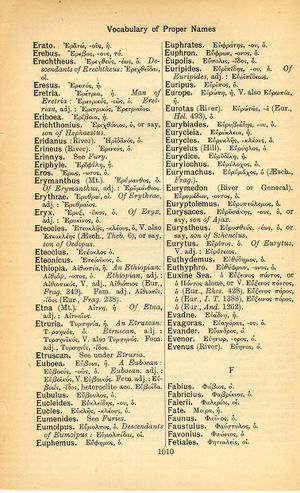Eretria: Difference between revisions
πενία μόνα τὰς τέχνας ἐγείρει → poverty alone promotes skilled work, necessity is the mother of invention, necessity is the mother of all invention, poverty is the mother of invention, out of necessity comes invention, out of necessity came invention, frugality is the mother of invention
(D_3) |
(Gf-D_3) |
||
| Line 1: | Line 1: | ||
{{WoodhouseENELnames | {{WoodhouseENELnames | ||
|Text=[[File:woodhouse_1010.jpg|thumb|link= | |Text=[[File:woodhouse_1010.jpg|thumb | ||
|link={{filepath:woodhouse_1010.jpg}}]][[Ἐρέτρια]], ἡ. | |||
<b class="b2">Man of Eretria</b>: Ἐρετριεύς, -ιῶς, ὁ. | <b class="b2">Man of Eretria</b>: Ἐρετριεύς, -ιῶς, ὁ. | ||
| Line 10: | Line 11: | ||
}} | }} | ||
{{Gaffiot | {{Gaffiot | ||
|gf=<b>Ĕrĕtrĭa</b>,¹⁶ æ, f. (Ἐρετρία), Érétrie<br /><b>1</b> [ville de l’Eubée, [[patrie]] du [[philosophe]] Ménédème] : Cic. Ac. 2, 129 || <b>-trĭus</b>, a, um, (<b>-trĭēnsis</b>, e), Érétrien, d’Érétrie : Plin. 33, 163 ; Nep. Paus. 2, 2 || <b>-triăcī</b> (<b>-trĭcī</b>), ōrum, m., les disciples de Ménédème : Cic. Ac. 2, 109 ; de Or. 3, 62 || <b>-triēnsēs</b>, ium, m., habitants d’Érétrie : Liv. 35, 38, 4<br /><b>2</b> ville de Thessalie : Liv. 32, 13, 9 ; 33, 6, 10. | |gf=<b>Ĕrĕtrĭa</b>,¹⁶ æ, f. (Ἐρετρία), Érétrie<br /><b>1</b> [ville de l’Eubée, [[patrie]] du [[philosophe]] Ménédème] : Cic. Ac. 2, 129 || <b>-trĭus</b>, a, um, (<b>-trĭēnsis</b>, e), Érétrien, d’Érétrie : Plin. 33, 163 ; Nep. Paus. 2, 2 || <b>-triăcī</b> (<b>-trĭcī</b>), ōrum, m., les disciples de Ménédème : Cic. Ac. 2, 109 ; de Or. 3, 62 || <b>-triēnsēs</b>, ium, m., habitants d’Érétrie : Liv. 35, 38, 4<br /><b>2</b> ville de Thessalie : Liv. 32, 13, 9 ; 33, 6, 10.||<b>-trĭus</b>, a, um, (<b>-trĭēnsis</b>, e), Érétrien, d’Érétrie : Plin. 33, 163 ; Nep. Paus. 2, 2||<b>-triăcī</b> (<b>-trĭcī</b>), ōrum, m., les disciples de Ménédème : Cic. Ac. 2, 109 ; de Or. 3, 62||<b>-triēnsēs</b>, ium, m., habitants d’Érétrie : Liv. 35, 38, 4<br /><b>2</b> ville de Thessalie : Liv. 32, 13, 9 ; 33, 6, 10. | ||
}} | }} | ||
Revision as of 07:36, 14 August 2017
English > Greek (Woodhouse)
Ἐρέτρια, ἡ.
Man of Eretria: Ἐρετριεύς, -ιῶς, ὁ.
Eretrian, adj.: Ἐρετρικός, Ἐρετριαῖος.
Latin > English (Lewis & Short)
Ĕrĕtrĭa: ae, f., = Ἐρετρία.
I The principal city on the island of Euboea, the birthplace of the philosopher Menedemus, now Palaeo Castro, Plaut. Merc. 3, 4, 59; Mel. 2, 7, 9; Plin. 4, 12, 21, § 64; Cic. Ac. 2, 42; Liv. 32, 16; 35, 38 al.—
B Derivv.,
1 Ĕrĕtrĭus, a, um, adj., Eretrian: creta, Plin. 33, 13, 57, § 163; so, terra, Cels. 5, 15; 6, 3.—Subst.: Eretria, ae, f., Plin. 35, 6, 21, § 38; Vitr. 7, 14.—
2 Ĕrĕtrĭ-ensis, e, adj., of Eretria: Gongylus, Nep. Paus. 2.—Subst., Ĕrĕtrienses, ium, m., the inhabitants of Eretria, Liv. 35, 38.—
3 Ĕrĕtrĭăci, ōrum, m., philosophers of the school of Menedemus, Cic. Ac. 2, 42, 109. —Also called,
4 Ĕrĕtrĭci, ōrum., m., Cic. de Or. 3, 17; Sen. Ep. 88 fin.—In sing.: Ĕrĕtrĭcus, an Eretrian philosopher, Cic. Tusc. 5, 39.—
II A city of Thessaly, in Phthiotis, now Tzangli, Liv. 32, 13; 33, 6.
Latin > French (Gaffiot 2016)
Ĕrĕtrĭa,¹⁶ æ, f. (Ἐρετρία), Érétrie
1 [ville de l’Eubée, patrie du philosophe Ménédème] : Cic. Ac. 2, 129 || -trĭus, a, um, (-trĭēnsis, e), Érétrien, d’Érétrie : Plin. 33, 163 ; Nep. Paus. 2, 2 || -triăcī (-trĭcī), ōrum, m., les disciples de Ménédème : Cic. Ac. 2, 109 ; de Or. 3, 62 || -triēnsēs, ium, m., habitants d’Érétrie : Liv. 35, 38, 4
2 ville de Thessalie : Liv. 32, 13, 9 ; 33, 6, 10.

